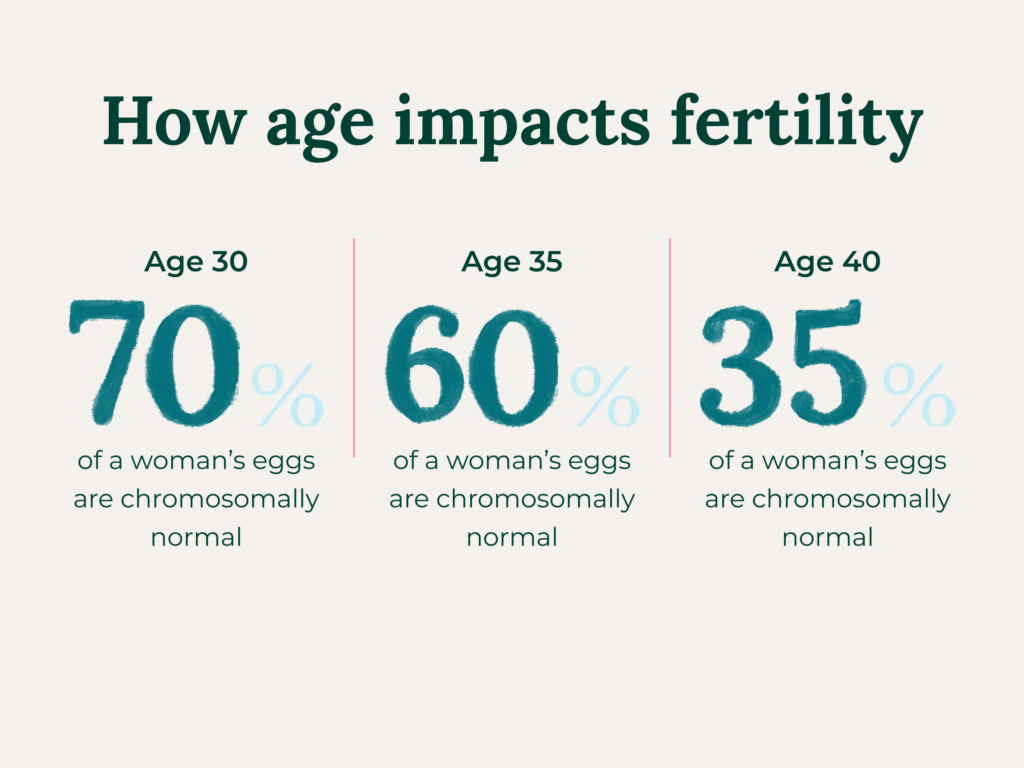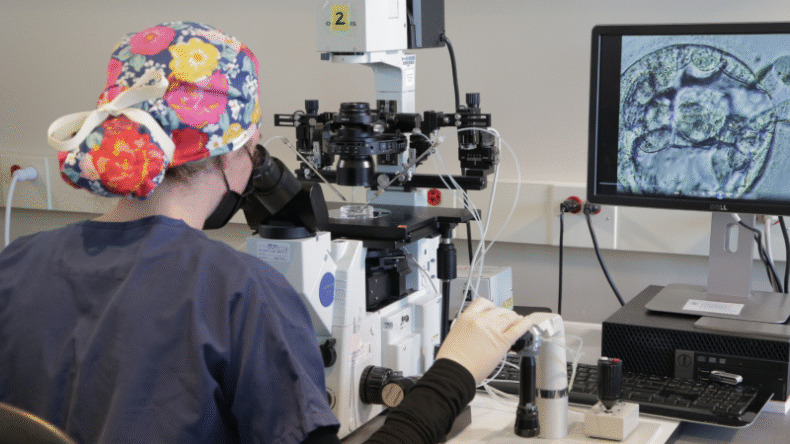For some women and couples struggling with infertility, getting pregnant isn’t the issue, but staying pregnant is. When you’re trying to build your family, suffering from pregnancy loss is devastating and takes a toll emotionally and physically, whether it’s one loss or a few, early on or a few months in.
It might make you feel better to know you’re not alone; about 1 in 4 known pregnancies end in miscarriage. There’s nothing you can do to cause or prevent a pregnancy loss or recurrent miscarriage: they almost always happen for reasons completely out of your control. Thankfully, fertility treatments like those we do every day here at CCRM can help limit your chances of pregnancy loss and increase the likelihood of having a healthy baby.
In honor of October being Pregnancy & Infant Loss Awareness Month —which commemorates all pregnancies and babies lost through miscarriage, ectopic pregnancy, termination for medical reasons, stillbirth, SIDS, illness, and other causes— here’s the truth about pregnancy loss including its causes, symptoms, treatment options, and why in this case age isn’t just a number.
What is pregnancy loss?
Pregnancy loss is defined as the spontaneous end to a pregnancy before 20 weeks gestation. Early pregnancy loss refers to a first trimester loss before 13 weeks of pregnancy; most occur within the first 12 weeks.
Pregnancy loss is a type of miscarriage, which implies the pregnancy ended on its own due to unforeseen issues with the embryo, the uterine environment, or both.
What causes pregnancy loss?
In most cases, pregnancy loss is out of your control, and nothing you do or won’t do while pregnant will cause a loss. Pregnancy loss is most often caused by:
Chromosomal abnormalities
In 60 to 70 percent of pregnancy losses, miscarriage is due to chromosomal abnormalities with the embryo. Most cells in the body have 46 chromosomes, 23 from the egg (mother) and 23 from the sperm (father), but some embryos develop with too many or too few chromosomes. These embryos won’t implant or, if they do, such pregnancies result in early loss.
Uterine environment
Even if you have a healthy embryo, you need a good uterine environment to help it develop into a healthy baby. In some cases, pregnancy loss is caused by factors in the uterus instead of by the embryo itself. These can include:
- Polyps
- Fibroids
- Uterine scarring
- Uterine septum or other congenital defects
There are additional pieces that need to come together in order for a pregnancy to succeed, including progesterone levels, thyroid function, and immune health. This is why getting pregnant (and staying pregnant) isn’t easy for everyone!
How does age impact pregnancy loss?
As the female partner ages, there’s a higher likelihood that she’ll ovulate an egg that’s chromosomally abnormal, which, even if fertilized by a ‘normal’ sperm, would result in a chromosomally abnormal embryo. Females are born with all the eggs they’ll ever have; both the quantity and quality of her eggs decline over time, which is why the rate of pregnancy loss steadily increases with age, especially after the age of 35

What are the symptoms of pregnancy loss?
If you’ve had a pregnancy loss with no accompanying symptoms, that’s considered a missed miscarriage. This type of loss is diagnosed by a provider based on transvaginal ultrasound and/or bloodwork results. For example, you may find out about a miscarriage because there is no fetal heartbeat detected on ultrasound, or your Human Chorionic Gonadotropin (HCG) level is not rising properly, and it can come as a complete shock. In many other cases, however, pregnancy loss is accompanied by any of the following symptoms as the products of conception (POC) dispel from the uterus:
- Heavy vaginal bleeding
- Passing tissue or clots
- Abdominal pain or cramping
How common is pregnancy loss?
If you’re experiencing pregnancy loss, you’re not alone: About 15 to 20 % of known pregnancies end in loss, most often in the first trimester, according to statistics from the American Society of Reproductive Medicine (ASRM). The numbers are even higher if you include unknown pregnancies in women who weren’t tracking ovulation or taking pregnancy tests and didn’t even know they were pregnant.
Recurrent pregnancy loss (RPL) is a condition defined by having two or more failed clinical pregnancies. The risk of future miscarriage increases after each loss. RPL affects fewer than 5% of women of reproductive age.
How does CCRM help with pregnancy loss?
CCRM offers many effective fertility treatments that help individuals and couples who have experienced recurrent pregnancy loss and improve the chances of having a healthy baby:
Embryo testing
CCRM performs preimplantation genetic testing for aneuploidy (PGT-A) in house through our propriety lab, CCRM Genetics, as part of an in vitro fertilization (IVF) cycle.
After the eggs are fertilized in the lab, an experienced embryologist carefully removes and biopsies a few cells from each blastocyst to test for chromosomal abnormalities. Only the embryos that have the correct number of chromosomes will be chosen for transfer, reducing your risk of implantation failure and pregnancy loss.
CCRM Fertility achieved the world’s first clinical case of PGT-A in 2007, and we’re proud to have some of the highest IVF with PGT success rates for women using their own eggs in the U.S, according to SART data.
Uterine testing
We can also run tests to evaluate the uterus to make sure it’s ready for pregnancy. The gold standard for this is hysteroscopy, where your provider will insert a small camera through the cervix to examine the uterine cavity. Hysteroscopy can help identify any potential issues that could be making implantation or sustaining a pregnancy more difficult, such as an abnormally-shaped uterus, fibroids, polyps, scar tissue, adenomyosis, or endometriosis.
What are the next steps after recurrent pregnancy loss?
Experiencing pregnancy loss is emotionally and physically exhausting, but you don’t have to face it alone. At CCRM, our double board-certified reproductive endocrinologists and infertility specialists can run tests and look at your medical history to help determine any potential causes of pregnancy loss. We’ll work with you to come up with a personalized treatment plan to help you overcome your fertility struggles and build your family.
Contact us today to book an appointment online at the CCRM Fertility clinic near you. We’ll guide you through the process and support you every step of the way.






